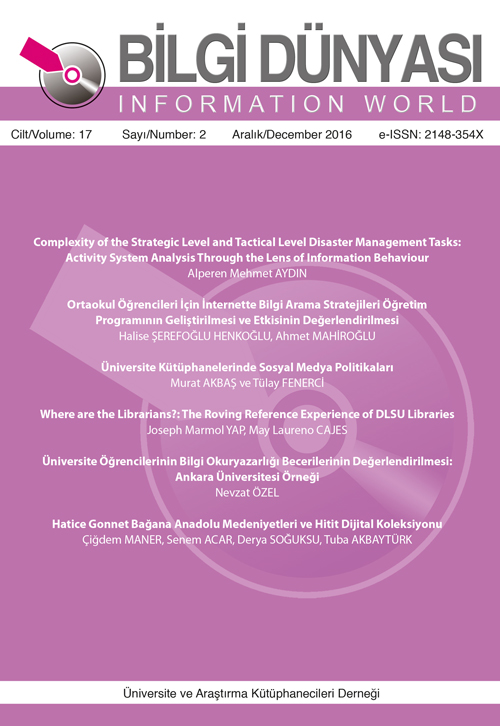Kütüphaneciler Nerede?: DLSÜ Kütüphanelerinin Gezici Danışma Deneyimleri
DOI:
https://doi.org/10.15612/BD.2016.506Anahtar Kelimeler:
Gezici bilgi danışma, danışma hizmetleri, gezici danışma, müşteri memnuniyeti, hizmet değerlendirme, FilipinlerÖzet
Gezici danışma kavramı Filipinler’de oldukça yenidir. 2012 yılında, De La Salle Üniversitesi (DLSÜ) Kütüphaneleri, “Seçilmiş Filipin Akademik Kütüphanelerinde Danışma ve Bilgi Hizmetleri: Eğilimler ve Geleceğe Bakış” başlıklı OCLC raporunda, gezici danışma hizmetini DLSÜ Kütüphanelerinin hizmetlerinin bir bölümü olarak başlatacaklarını paylaşmıştır. GBD ya da diğer adıyla Gezici Bilgi Danışma 2013 yılında başlatılmış ve 2014 Temmuz ayında pilot olarak denenmiştir. GBD hizmeti kütüphane personeline kullanıcılarla daha yakından ilgilenme, bilgi hizmetini genişletme ve bilgi alışverişinde daha yüksek seviyede müşteri hizmeti oluşturma imkânı sağlamaktadır. Kütüphanecilerin varlığı kütüphanenin bölümlerinde gezinirken daha da görülebilir olmaktadır. Bu değerlendirme araştırması GBD hizmetinin amacına ulaşıp ulaşmadığını belirlemeye çalışmaktadır. Hem kullanıcılardan hem de kütüphanecilerden geri dönüş almak için çevrimiçi değerlendirme formları kullanılmıştır. Bu makale De La Salle Üniversitesi Kütüphanelerinin gezici danışma hizmetinin bilgi alışveriş deneyimlerini ve sonuçlarını aktarmaktadır.
İndirmeler
Yayınlanmış
Nasıl Atıf Yapılır
Sayı
Bölüm

Bu çalışma Creative Commons Attribution 4.0 International License ile lisanslanmıştır.






